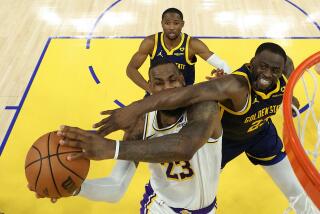Turner’s Zigzag Style Is a Merger of Maverick, Mogul
Like a racing sloop furiously tacking back and forth against the wind, former championship sailor Ted Turner’s life and business career is a history of unexpected zigs and zags.
In the 1970s, Turner was the loudmouthed “Captain Outrageous” and the “Mouth of the South.” He once sat in the dugout with his Atlanta Braves to personally manage the major league baseball team, and another time fell off a chair in a drunken stupor during a televised press conference celebrating his America’s Cup victory.
Turner’s metamorphosis in the 1980s and 1990s couldn’t have been more drastic. The 56-year-old maverick proved visionary when he successfully aired news on television 24 hours a day and built a profitable television channel from a film library everyone said he’d go bankrupt buying. In his personal life he continued to surprise, marrying actress and liberal activist Jane Fonda, who seemed to be his ideological opposite.
Another unforeseen zig occurred Wednesday when Time Warner Inc. confirmed that it is negotiating to buy the Turner Broadcasting System he heads for $8.5 billion in stock, proving again that the most predictable thing about Turner is his unpredictability. No one in the media and entertainment business is more capable of surprise, changing course and proving doubters wrong.
“In a business that has gotten exceedingly corporate, Ted is one of the few real showmen left,” said David Tenzer, a television agent at Creative Artists Agency. “He’s very entrepreneurial in a way that harks back to studio moguls of the past.”
Plenty of skeptics on Wall Street and in Hollywood remain convinced that the story is far from over, and that Turner’s fate will once again tack sharply. They see Turner eventually balking at the deal, or another bidder emerging.
“Why would Ted want this?” asked one bewildered senior Hollywood executive, noting that the deal flies in the face of Turner’s longtime dream of owning one of the three major television networks.
The point is well taken. It’s hard to imagine an entrepreneur worth more than $2 billion--who has publicly declared in his frequently bombastic style that he wants to own the world--working as an employee of Time Warner. From his base in Atlanta, Turner has built an empire with nearly $3 billion in annual revenue and boasting television programming viewed in 160 million homes in more than 200 countries.
Moreover, Turner has complained bitterly that Time Warner, which owns 18% of Turner Broadcasting, has tied his hands when it comes to buying a TV network. And few seem convinced that he’s given up that dream for good. Turner recently joked to television critics that he wakes up in the middle of the night, slams his bed with his fist and screams: “I’ve got no network!”
In a shoot-from-the-lip comment for which he caught some flak, Turner went so far as to compare the obstacles placed in his way to the treatment of Jews in Germany during World War II.
On Wednesday, the list of possible scenarios for Turner discussed around Hollywood was seemingly endless. One has NBC owner General Electric Co. trumping Time Warner with a bid for Turner Broadcasting, or even making a huge bid for Time Warner itself. Another has an initially skeptical Turner warming to Time Warner overtures with an eye toward eventually running Time Warner himself.
There is even one scenario that has Turner and Fonda retiring to raise buffalo on their Montana ranch, where Time Warner Chairman Gerald Levin traveled earlier this month to pitch the merger plan. Executives who know Turner, however, say someone with his drive and ego would never be happy on the sidelines.
Or maybe, the proposed merger is just what it seems. People close to Turner insist that he was profoundly influenced by the recent flurry of media mergers--capped by the $19-billion Walt Disney Co. deal for Capital Cities/ABC announced in late July. Turner, they say, realizes that he must be part of a big conglomerate to compete.
“The Disney-ABC deal was a wake-up call to all of us,” said one senior Turner Broadcasting executive.
Said another senior executive of the company: “Ted is convinced that content will be critical to the future, and that this company will be one of the largest, if not the largest, content company in the business.”
A former Turner Broadcasting executive said he believes that Turner realized he cannot get the money to finance a bid for a TV network without investors who would undoubtedly rein him in.
“He probably looked at his smaller army and said commanding the Northern troops in this version of Ted’s Civil War is a better place to be,” the executive said.
If that is the case, Turner’s fate remains largely in the hands of cable giant Tele-Communications Inc. and its chief executive, John Malone. TCI is a major investor in Turner Broadcasting and has the power to veto any deal if Malone decides it isn’t in his company’s interest.
Some see the potential deal with Time Warner as typical of Turner’s brash moves in the past.
“Ted is an extraordinarily smart, adept player, so successful because he’s a buccaneer rather than a corporate type. He’s got real vision, is tremendously entrepreneurial and is willing to take enormous risks,” said Peter Chernin, chairman of Fox Films Entertainment
Although Turner seemingly acts on instinct at times, those close to him say that isn’t the case at all. Beneath Turner’s image as a seat-of-the-pants riverboat gambler is someone who is far more calculating than he seems.
“The biggest misconception about Ted is that he shoots from the hip. The opposite is true. He gives a tremendous amount of thought to things. Before he does something, he takes all the right steps he’s supposed to take and is as careful as the most conservative businessman in America,” said Alan F. Horn, chairman and chief executive of the Hollywood production company Castle Rock Entertainment, which Turner bought two years ago.
More important than calculation, when Turner sets a goal, he pushes to the limit to reach it.
Cable News Network anchor Bernard Shaw said that “people laughed in his face and ours, saying we’d go broke because there wasn’t enough news to fill the airwaves 24 hours a day. But his character and his sense of history wouldn’t let him give up. After the boys and girls at the other networks stopped sneering, they started looking over their shoulders.”
Born in Cincinnati, Turner moved to Savannah, Ga., at age 9. His father, Ed, owned a billboard company and was especially rough on his son, punishing him when he didn’t read enough and even charging him rent when he came home on vacations from military school, according to biographies of Turner.
In 1962, his father paid $4 million to expand his firm into the biggest outdoor advertising firm in the South. Convinced he erred, his father then arranged to sell the business to a friend and committed suicide. Turner scrapped the sale and took over.
Turner showed a brash, push-it-to-the-limit style. According to Turner biographers Robert Goldberg and Gerald Jay Goldberg, Turner talked cavalierly about killing himself to shock people or give himself an edge in a venture. He even used the threat as a way to get bankers off his back. In 1985, haunted by his father’s death and marital problems at the time, Turner sought therapy and was prescribed the anti-depressive drug lithium. Turner has publicly acknowledged that medication helped his emotional health.
In 1976, Turner revolutionized cable television when he began the nationwide transmission of his local Atlanta UHF station, which he bought in 1970, to cable systems hungry for new programming. People in Idaho could watch Turner’s Braves, which he bought in 1976, and would soon watch the Atlanta Hawks basketball team, which he also acquired.
Turner’s reputation as a sportsman and team owner initially overshadowed his business career. The flamboyant Turner shook up the stuffy world of yachting in 1977 when he spent $1.7 million to win the prestigious America’s Cup. In 1980, when he was beaten by Dennis Conner, he spent only $400,000, bought a used boat and sanded the bottom with his crew. He stayed in a dormitory with his crew, eating hamburger each night.
A Civil War fanatic, Turner appeared in a cameo role as a Confederate officer in the film “Gettysburg,” which his company financed. His love of “Gone With the Wind,” a film he acquired when he bought the Metro-Goldwyn-Mayer library in 1986, is demonstrated by a painting of Clark Gable as Rhett Butler outside his office. Turner named one son Rhett and reportedly would have named a daughter Scarlett if his wife at the time hadn’t objected.
In 1980, Turner made his biggest bet to date when he started CNN amid conventional wisdom that it would drive him into bankruptcy.
“I remember being at a baseball game with Ted,” recalled New York Yankees owner George Steinbrenner. “There was a group of us, and he was saying he wanted to broadcast the news all day long because he had to wait until 6 and 11 to get news. I said to myself: ‘What the hell is he talking about?’ But damn if he didn’t do it.”
The result was CNN, which became a leading force in global broadcasting and set the standard for coverage in the Persian Gulf War in 1991, with Iraqi leader Saddam Hussein and then-President George Bush each watching it for updates.
Regardless of the outcome of the latest merger proposal, people who know Turner say he will remain a major player in communications.
Said acting Major League Baseball Commissioner Bud Selig: “The one thing about Ted is that he’s never boring.”
* HIGH-STAKES STRATEGY: What’s behind Time Warner’s bid for Turner. D1
* MORE COVERAGE: D1, D4-D5
More to Read
The biggest entertainment stories
Get our big stories about Hollywood, film, television, music, arts, culture and more right in your inbox as soon as they publish.
You may occasionally receive promotional content from the Los Angeles Times.










